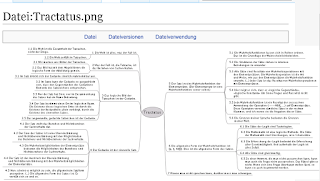As a philosopher, he is famously remembered as someone who maintained that metaphysical language was misguided, and ultimately meaningless. In fact, he often said he was completely misunderstood by his contemporaries and would become quite agitated. He wrote a work in his youth, in German, which ultimately became his doctoral thesis at Cambridge, giving him English citizenship. His Cambridge lectures in English were noted by his students and became part of his legacy English works. His English was correct, but contained Germanisms.
His Tractatus Logico-Philosophicus (1921) is highly structured:
He ultimately claims that of that which one cannot speak, one must remain silent. Which sounds like interesting vaguely mystical conclusion. Problem is, this occurs in his early work and not
his mature one. Interesting!

No comments:
Post a Comment